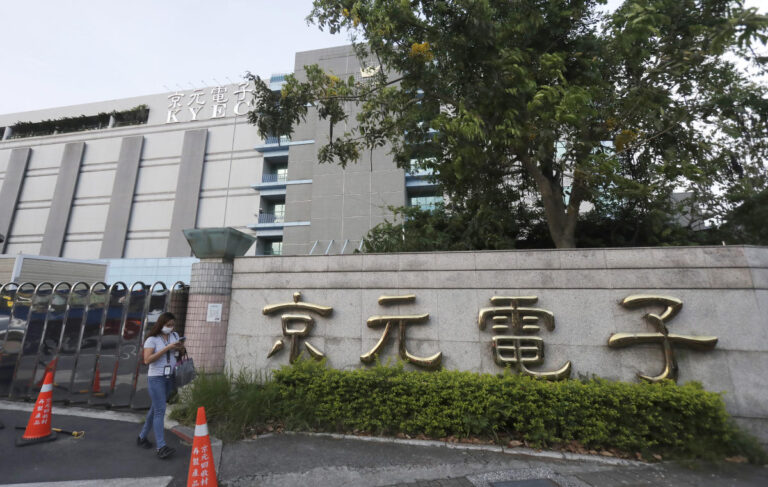WASHINGTON (AP) — Whether it’s tapioca balls or computer chips, Taiwan is stretching toward the United States, and a world that threatens to seize the democratically governed island by force if necessary. It is moving away from China, the second largest economic power.
This led the world’s largest computer chip maker, which powers everything from medical equipment to mobile phones, to announce larger investments in the United States last month, backed by the Biden administration. Shortly after, the Taiwanese semiconductor company announced it was ending two decades of operations in mainland China amid a global race to gain an edge in the high-tech industry.
These changes, as Sino-American tensions intensify, will strengthen Taiwan’s efforts to reduce dependence on China and protect itself from Chinese pressure while forging closer economic and trade ties with its strongest ally, the United States. It reflects. The shift comes as China’s economic growth slumps and global companies look to diversify after the pandemic disrupts supply chains.
Underscoring this shift, the United States displaced mainland China as Taiwan’s top export destination in the first quarter of this year, the first time since comparable data became available in early 2016. In the first three months, the island exported $24.6 billion worth of goods to the United States, compared to $22.4 billion to mainland China, according to Taiwan’s official data.
Meanwhile, Taiwan’s investment in mainland China has fallen to its lowest level in more than 20 years, dropping nearly 40% from the previous year to $3 billion last year, according to Taiwan’s Ministry of Economic Affairs. However, Taiwan’s investment in the United States soared ninefold to $9.6 billion in 2023.
Washington and Taipei signed a trade agreement last year and are currently negotiating the next stage. U.S. lawmakers have also introduced a bill to end double taxation on Taiwanese companies and workers in the United States.
Daniel Krittenbrink, assistant secretary of state, said, “All are motivated by a desire to build deterrence on Taiwan and its resilience, all to maintain the status quo and ensure that China takes no action against Taiwan… “It helps resist the temptation to do so.” .
TSMC, the world’s largest computer chip maker, announced last month that it would increase its investment in the United States to $65 billion. This comes after the Biden administration pledged up to $6.6 billion in incentives to put the company’s Arizona facility on track to produce about a fifth of the world’s most advanced chips by 2030. was.
Apart from its investments in the United States, TSMC is also putting money into Japan, which is an avid supporter of the United States in the region. Foxconn, the Taiwanese conglomerate best known as a prime contractor for Apple, is building manufacturing capacity in India, and another Taiwanese company, Pegatron, which makes iPhone and computer parts, is also investing in Vietnam.
Jinyuan Electronics, a Taiwanese company specializing in semiconductor testing and packaging, announced last month that it would sell a $670 million stake in a venture company in the eastern Chinese city of Suzhou. KYEC cited geopolitics, the US ban on exporting advanced chips to China, and the Chinese government’s policy of seeking technological self-sufficiency.
KYEC said in a statement, “The ecological environment for semiconductor manufacturing in China is changing, and market competition is becoming more and more intense.”
Exports of semiconductors, electronic components and computer equipment from Taiwan to the United States have more than tripled since 2018, reaching nearly $37 billion last year. It’s not just technology. The island more than tripled its exports of tapioca and its substitute, a key ingredient in boba milk tea, to the United States between 2018 and 2023, and shipped more fruit, nuts and farmed fish. Masu.
Hung Tran, a nonresident senior fellow at the Atlantic Council Center for Geoeconomics, said recent trade statistics highlight “strategies by both Taiwan and the United States to redirect trade to avoid risks from China.” He said it was reflected.
Taiwan’s share of exports to mainland China and Hong Kong fell from about 44% in 2020 to less than one-third in the first quarter of 2024. This was “a huge move,” Tran said. “And I think the share[of exports to mainland China and Hong Kong]will probably continue to decline.”
Since the 1990s, the Chinese government has sought to balance its territorial claims over Taiwan with favorable economic and trade policies, with the aim of bringing the two countries closer together and making it harder for Taiwan to secede.
When the independence-minded Democratic Progressive Party took power in Taiwan in 2016, the new government set out a policy of distancing Taiwan from the mainland and strengthening economic ties with other countries in the region, particularly Southeast Asia. Frustrated, the Chinese government tried to use its economic power to corner Taiwan.
It restricted travel to Taiwan by mainland tourists and halted imports of Taiwanese seafood, fruit and snacks. In 2021, China banned Taiwanese pineapples over biosecurity concerns, devastating Taiwanese farmers as nearly all of their exported fruit went to the mainland.
Ralph Cossa, president emeritus of the Pacific Forum, a Honolulu-based foreign policy research institute, said Beijing’s actions helped push Honolulu away.
Chinese President: “Xi Jinping is tactically smart, but many of the decisions he has made are strategically stupid.” His loyalty tests with Taiwanese businessmen and other high-handed business practices and decisions are He said the country had made a major contribution to the success of its policy of distancing itself from China.
And that policy will continue with the island’s new president, Kiyonori Lai, Kossa said.
____
AP data reporter Aaron Kessler in Washington and video journalist Johnson Lai in Taipei contributed.

